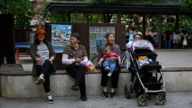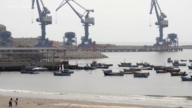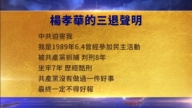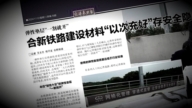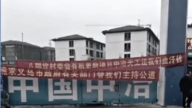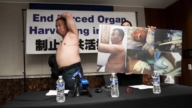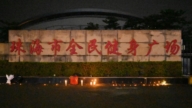【新唐人2014年03月24日訊】有諸多跡象顯示,中國樓市的繁榮期正在接近尾聲。近來到訪中國任何一個城市的遊客,都會發現,那裏有大量建造過多的樓房,這些所謂的「鬼城」,國際媒體認為是中國「樓市繁榮期即將結束的明顯證據」。而大陸企業家分析,雖然中國的房地產泡沫越來越大,但是開發商、銀行和政府會拚命維繫,可是一旦房地產泡沫破裂,中共體制也將隨之崩潰。
美國《華爾街日報》3月19號報導說,在中國北部工業城市哈爾濱,從機場進入市區的路上,可以看到郊區有大量「鬼城」,也就是遍佈著大量空置高樓的社區。這些空置樓房成為了中國中產階級不斷增長的財富的歸宿。在上海和北京這樣的大城市,房價在2002至2012年間上漲高達五倍。
大陸企業家王瑛說,中國各個地方的房子供大於求,這是一個很普遍的現象。但是她認為,當局會千方百計的維繫目前的狀態,因為銀行的錢和政府的錢都在這裡面。
中國企業家王瑛:「銀行把錢貸給了房地產商,房地產商把房子押給了銀行。他們總是要千方百計的使這個鏈條不斷,因為一旦斷了的話,他們這些人的很多利益都會被砸在裡頭。因此他們不願意讓它斷。實際上地方政府跟這個房子的關係是千絲萬縷,所以房地產商、銀行,加政府,他們之間會捆綁起來,來維持現有的這個房價。」
王瑛表示,過去三十年,中國的房子,實際上是社會財富重新分配的一個重要工具。
王瑛:「如果當年是打土豪、分田地,來實現了財產重新分配的話,這三十年,實際上最大範圍內的財產分配的工具是房子。因為它不是按規則分配的。中國的很多人從無財產到有財產,有一點財產到有不少財產,他們實際上都是透過房子完成的。」
可是現在,中國的很多房地產投資出現了問題。今年1月份,全中國新建住房價格同比漲幅,一年來第一次放緩,成交量也在萎縮。
最近中共當局推出新規,要求處級以上官員登記房產。很多官員紛紛將手中的房產進行處理。
王瑛:「就說這些房子吧,實際上是很多官員擁有的財產,尤其是那些不能夠擺到明面上的財產。所以這些人大概對房子的態度,包括他們是不是會繼續按照原來的方式擁有更多的房子,其實是影響中國的房地產市場的一個蠻重要的原因。」
而現在人們看到中國的房市泡沫越來越大,當局也很難找到辦法來中斷這個惡性循環。然而,王瑛指出,他們越是覺得這個危險排除不了,越會把各種各樣資源向這裡集中。
王瑛:「就特別像這有一個大堤,那邊是大江大河,洶湧澎湃,可是堤內有他們的萬畝良田。他們的良田不可能搬家,他們只好不斷的把那個大堤往高裡修。」
這個越來越大的房地產泡沫終究將有破的一天。王瑛表示,她無法預測是哪一天。但是,當那一天來臨,那將是中共政權的一大劫。
王瑛:「我是覺得房地產泡沫的崩實際上是這個體制的一個大劫。房地產泡沫一崩,這個體制就再也無法維持下去了。中國的房地產泡沫,已經包含了這個體制幾乎全部的內容。因此你讓我預期房地產泡沫甚麼時候崩,幾乎就是讓我預期中國現在的這個體制甚麼時候會坍塌?我說我現在做不出判斷。」
美國華裔作家章家敦曾說,中共領導人在政治上有不安全感,所以他們痛恨經濟下跌。由於他們有資源和權力避免市場修正,所以他們就這麼做。但也因為如此,積纍的不平衡就越來越大。但是積纍的不平衡變大以後,最終無法避免的房市崩盤就將變得非常嚴重。
採訪編輯/秦雪 後製/李智遠
Doom to the Party: The Collapse of China’s Housing Market
Many indications that the Chinese real estate
boom is nearing an end are showing themselves.
Tourists who visit any Chinese city will find an excessive
amount of newly constructed houses,
resulting in ghost towns.
These so-called ghost towns are regarded by foreign
media as clear evidence that the housing boom
is coming to an end.
A Chinese entrepreneur said despite China’s swelling
housing bubble, the Chinese Communist Party (CCP)
and its banks, as well as developers are desperately
trying to save the market.
However, once the bubble finally bursts, the CCP’s
regime will subsequently collapse.
The Wall Street Journal reported on March 19 that in Harbin,
an industrial city in North China, many ghost towns
are visible when heading downtown from the airport.
Ghost towns are mostly unoccupied communities
with many high-rise residences.
The truth is that much of the savings of China’s middle-class
were spent buying those houses.
In big cities such as Shanghai and Beijing, housing prices
have risen by five times between 2002 and 2012.
Wang Ying, a Chinese entrepreneur, said an excessive
housing supply is a phenomena seen all over China.
Wang believes that the CCP authorities will still try
their best to maintain the current situation
because the government and banks have invested
so much into the market.
Wang Ying: “Banks make loans to developers and developers
mortgage houses to banks.
Many local governments are also involved in such business.
Therefore the CCP officials make every effort to keep
that connection; otherwise all their interests will be lost.
In other words, they don’t want such an interest chain
to be cut off.
For this reason, developers, banks and governments form
an interest group to drive the current housing prices.”
Wang Ying commented that in the past three decades,
China’s housing market has been an important tool
of the Communist Party in redistribution of social wealth.
Wang Ying, Chinese entrepreneur: “The party used
to redistribute social wealth by killing landlords
and seizing their land.
In the last three decades, the housing market had become
the most important tool to do the same.
However, the redistribution did not follow rules
commonly understood by the public.
Chinese people never owned property for the purpose
of acquiring assets, and were unaware assets
could be acquired through owning a home.”
Currently, serious problems have developed with many
real estate investments.
This January, the price of new housing growth showed
a slowdown compared to last January, the first time in a year.
Meanwhile, the total trade volume also began to drop.
The CCP authorities recently issued new regulations requiring
officials higher than divisional-level to declare all property.
Consequently, many officials had to quickly
dispose of their houses.
Wang Ying: “For many officials, a large proportion
of their assets, especially concealed, are private houses.
The future attitude of this group regarding housing
purchases, will indeed impact China’s house market.”
Now, as the CCP authority finds it extremely difficult
to break the vicious cycle of the swelling housing bubble,
many people have taken notice.
Wang Ying believes that the more dangerous the party
believes the situation is, the more resources
they will pour into the housing market.
Wang Ying: “It (the current bubble) is like a dike holding
a flooding river.
All their farmland and crops are protected by the dike.
As they cannot move their farmland, the only thing to do
is to continuously build the dike up to a higher level.”
Eventually, the swelling housing bubble has to burst.
Wang Ying said she does not know when that will happen.
However, once that day comes, it will bring a great disaster
to the CCP’s regime.
Wang Ying: “I think the collapse of China’s house market
is a doom to the party.
Once the housing bubble bursts, the party will no longer
be able to maintain its regime.
All serious problems of the regime have been reflected
in China’s housing market.
Therefore any prediction of when housing bubble
will burst is almost equivalent to talking about
when the entire regime will collapse.
Currently I cannot comment further.”
Gordon G. Chang, famous Chinese-American author,
once said the CCP leaders hate to see any economic decline,
as it makes them feel insecure about their political power.
As they have enough resources and power to affect
the market, they use them to avoid a natural recession.
For the same reason, the market imbalance
keeps heading towards an extreme.
After that imbalance exceeds a certain level,
the unavoidable collapse of the housing market
will finally lead to disastrous consequences
to the entire regime.
Interview & Edit/Qinxue Post-Production/Lizhiyuan


